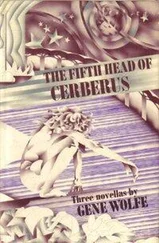“On the contrary.”
She leaned forward as though to examine my face through the eyeholes. Her own mask, which was the color of her gown, was so small that it was hardly more than a convention, two almond-shaped loops of fabric about her eyes; yet it lent her an exotic air she would not otherwise have possessed, and lent her too, I think, a feeling of mystery, of a concealment that lifted from her the weight of responsibility.
“You are a very intelligent man I am sure, but you haven’t been to as many of these things as I have, or you would have learned the art of judging faces without seeing them. It’s hardest, of course, when the person you’re looking at has on a wooden vizard that doesn’t conform to the face, but even then you can tell a great deal. You have a sharp chin, don’t you? With a little cleft.”
“Yes to the sharp chin,” I said. “No to the cleft.”
“You’re lying to throw me off, or else you’ve never noticed it. I can judge chins by looking at waists, particularly in men, which is where my chief interest lies. A narrow waist means a sharp chin, and that leather mask leaves just enough showing to confirm it. Even though your eyes are deeply set, they’re large and mobile, and that means a cleft chin in a man, particularly when the face is thin. You have high cheekbones — their outlines show a trifle through the mask, and your flat cheeks will make them look higher. Black hair, because I can see it on the backs of your hands, and thin lips that show through the mouth of the mask. Since I can’t see all of them, they curve and curl about, which is a most desirable thing in a man’s lips.”
I did not know what to say, and to tell the truth I would have given a great deal to leave her just then; at last I asked, “Do you want me to take my mask off so you can check the accuracy of your assessments?”
“Oh, no, you mustn’t. Not until they play the aubade. Besides, you should consider my feelings. If you did and I found you weren’t handsome after all, I should be deprived of an interesting night.” She had been sitting up. Now she smiled and leaned back on the divan again, her hair spreading about her in a dark aureole. “No, Severian, instead of unmasking your face, you must unmask your spirit. Later you will do that by showing me everything you would do were you free to do whatever you wished, and now by telling me everything I want to know about you. You come from Nessus — I’ve learned that much. Why are you so eager to find the Pelerines?”
VI
The Library of the Citadel
AS I WAS about to answer her question, a couple strolled by our alcove, the man robed in a sanbenito, the woman dressed as a midinette. They only glanced at us as they passed, but something — the inclination, perhaps, of the two heads together, or some expression of the eyes — told me that they knew, or at least suspected, I was not in masquerade. I pretended I had noticed nothing, however, and said, “Something that belongs to the Pelerines came into my hands by accident. I want to return it to them.”
“You’re not going to do them harm then?” Cyriaca asked. “Can you tell me what it is?”
I did not dare to tell the truth, and I knew I would be asked to produce whatever object I named, and so I said, “A book — an old book, beautifully illustrated. I don’t pretend to know anything about books, but I feel sure it’s of religious importance and quite valuable,” and from my sabretache I drew the brown book from Master Ultan’s library that I had carried away when I left Thecla’s cell.
“Old, yes,” Cyriaca said. “And more than a little water-stained, I see. May I look at it?”
I handed it to her and she fanned the pages, then stopped at a picture of the sikinnis, holding it up until it caught the gleam of a lamp burning in a niche above our divan. The homed men seemed to leap in the flickering light, the sylphs to writhe.
“I don’t know anything about books either,” she said, handing it back. “But I have an uncle who does, and I think he might give a great deal for this one. I wish he were here tonight so he could see it — though perhaps it’s all for the best, because I’d probably try to get it from you in some way. In every pentad he travels as far as I ever did when I was with the Pelerines, just to seek out old books. He’s even gone to the lost archives. Have you heard about those?”
I shook my head.
“All I know is what he told me once when he had drunk a little more of our estate cuvee than he usually takes, and it may be that he didn’t tell me everything, because as I talked to him I had the feeling he was a bit afraid I might try to go myself. I never have, though I’ve regretted it sometimes. Anyway, in Nessus, a long way south of the city most people visit, so far down the great river in fact that most people think the city would have ended long before, there stands an ancient fortress. Everyone save perhaps for the Autarch himself — may his spirit live in a thousand successors — has forgotten it long ago, and it’s supposed to be haunted. It stands upon a hill overlooking Gyoll, my uncle told me, staring out over a field of ruined sepulchers, guarding nothing.”
She paused and moved her hands, shaping the hill and its stronghold in the air before her. I had the feeling that she had told the story many times, perhaps to her children. It made me conscious that she was indeed old enough to have them, children old enough themselves to have listened to this and other tales many times. No years had marked her smooth, sensuous face; but the candle of youth that burned so brightly still in Dorcas and had shed its clear, unworldly light even about Jolenta, that had shone so hard and bright behind Thecla’s strength and had lit the mist-shrouded paths of the necropolis when her sister Thea took Vodalus’s pistol at the grave side, had in her been extinguished so long that not even the perfume of its flame remained. I pitied her.
“You must know the story of how the race of ancient days reached the stars, and how they bargained away all the wild half of themselves to do so, so that they no longer cared for the taste of the pale wind, nor for love or lust, nor to make new songs nor to sing old ones, nor for any of the other animal things they believed they had brought with them out of the rain forests at the bottom of time — though in fact, so my uncle told me, those things brought them. And you know, or you should know, that those to whom they sold those things, who were the creations of their own hands, hated them in their hearts. And truly they had hearts, though the men who had made them never reckoned with that. Anyway, they resolved to ruin their makers, and they did it by returning, when mankind had spread to a thousand suns, all that had been left with them long before.
“So much, at least, you should know. My uncle once told it to me as I have told it to you, and he found all that and more recorded in a book in his collection. It was a book no one had opened, as he believed, for a chiliad.
“But how they did what they did is less well known. I remember that when I was a child, I imagined the bad machines digging — digging by night until they had cleared away the twisted roots of old trees and laid bare an iron chest they had buried when the world was very young, and that when they struck off the lock of that chest, all the things we’ve spoken of came flying out like a swarm of golden bees. That’s foolish, but even now I can hardly imagine what the reality of those thinking engines can have been like.”
I recalled Jonas, with the light, bright metal where the skin of his loins ought to have been, but I could not picture Jonas setting free a plague to trouble mankind, and shook my head.
“But my uncle’s book, he said, made clear what it was they did, and the things they let go free were no swarm of insects but a flood of artifacts of every kind, calculated by them to revive all those thoughts that people had put behind them because they could not be written in numbers. The building of everything from cities to cream pitchers was in the hands of the machines, and after a thousand lifetimes of building cities that were like great mechanisms, they turned to building cities that were like banks of cloud before a storm, and others like the skeletons of dragons.”
Читать дальше










